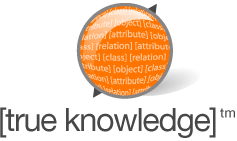29 results for wikipedia question answering
 True Knowledge is a natural language search engine and question answering site, but to leave it at that would not do the site justice. What makes it stand out from similar sounding services like Powerset and Freebase? True Knowledge tackles natural language search and question answering (much like Powerset and Hakia), and it also maintains a knowledge base of facts about the world (similar to DBpedia and Freebase). However, what makes True Knowledge stand out is that they've combined these features and encourage their userbase to contribute facts and add new knowledge.
True Knowledge is a natural language search engine and question answering site, but to leave it at that would not do the site justice. What makes it stand out from similar sounding services like Powerset and Freebase? True Knowledge tackles natural language search and question answering (much like Powerset and Hakia), and it also maintains a knowledge base of facts about the world (similar to DBpedia and Freebase). However, what makes True Knowledge stand out is that they've combined these features and encourage their userbase to contribute facts and add new knowledge.
Continue reading True Knowledge: The Natural Language Question Answering Wikipedia for Facts
While I am still waiting for an invitation from Twine (probably you too?) I have received one from Powerset - natural language search. Powerset obviously is a promising company (and is promising a lot), so I was excited when I was starting to play around with this new tool which still isn't available for the public.
Continue reading Natural Language Search - A New Breakthrough?
 The Curse of Knowledge: the more you know, the more difficult it is for you to communicate knowledge. When we know something, we can hardly imagine not knowing it. The more we learn about something, the more it becomes even harder for us to think of not knowing it. It is generally difficult for experts (who know much) to explain their expertise to laymen (who know little) because experts have to try hard to imagine the scenario when they were not experts. This is the Curse of Knowledge.
The Curse of Knowledge: the more you know, the more difficult it is for you to communicate knowledge. When we know something, we can hardly imagine not knowing it. The more we learn about something, the more it becomes even harder for us to think of not knowing it. It is generally difficult for experts (who know much) to explain their expertise to laymen (who know little) because experts have to try hard to imagine the scenario when they were not experts. This is the Curse of Knowledge.
Continue reading The Curse of Knowledge and the Semantic Web
A lot of you emailed me asking where to find more videos, so I'm delivering the goods. I've expanded the previous list from a paltry 17 to a remarkable 302, and I've included podcasts this time! There were so many videos I had to break them up into different categories for easier skimming. There are no duplicates, however I did place some videos into more than one category when I felt it was appropriate. This list is monstrous, enjoy.
Continue reading 302 Semantic Web Videos and Podcasts!
The discussion of semantic search has gradually become popular. Just not long time ago, semantic search was thought to be barely a little bit more than a dream. At present, optimistic researchers have started to believe its possibility in the near future. Very recently at Read/WriteWeb, Dr. Riza C. Berkan, the CEO of Hakia (a company declared to perform "semantic search"), posted an article about semantic search that attracted much attention. Despite of agreeing with the post, here are more thoughts about semantic search.
Continue reading Semantic search has two legs
 To begin with, there is a very simple idea: Websites should themselves indicate their changes to the search engines. I've already touched upon the subject in the previous part of this series, right now search engines have a reversed approach which consists of crawling the Web constantly looking for the slightest modification. Don't you think it's silly? Think about the number of Web pages to visit, imagine the cost to get the lowest frequency between each visit. Consequently, it seems difficult to consider the development of new search engines today. Nevertheless, the advent of the Semantic Web should lead to their multiplication, in a vertical way, while search engines are getting specialized more and more in specific fields.
To begin with, there is a very simple idea: Websites should themselves indicate their changes to the search engines. I've already touched upon the subject in the previous part of this series, right now search engines have a reversed approach which consists of crawling the Web constantly looking for the slightest modification. Don't you think it's silly? Think about the number of Web pages to visit, imagine the cost to get the lowest frequency between each visit. Consequently, it seems difficult to consider the development of new search engines today. Nevertheless, the advent of the Semantic Web should lead to their multiplication, in a vertical way, while search engines are getting specialized more and more in specific fields.
Continue reading The Object Oriented Web - Part 2 - Datahubs
 Now that Freebase is available as Linked Data a big question that comes to mind is whether these two major projects will move to assimilate one another. DBpedia and Freebase – two endeavors primarily focused on curating unstructured and semi-structured data about everything and releasing it back into the wild (with structure) – get the bulk of their information from Wikipedia, so the amount of topical overlap is assumed to be extremely high. DBpedia gains new information when it extracts data from the latest Wikipedia dump, whereas Freebase, in addition to Wikipedia extractions, gains new information through its userbase of editors.
Now that Freebase is available as Linked Data a big question that comes to mind is whether these two major projects will move to assimilate one another. DBpedia and Freebase – two endeavors primarily focused on curating unstructured and semi-structured data about everything and releasing it back into the wild (with structure) – get the bulk of their information from Wikipedia, so the amount of topical overlap is assumed to be extremely high. DBpedia gains new information when it extracts data from the latest Wikipedia dump, whereas Freebase, in addition to Wikipedia extractions, gains new information through its userbase of editors.
Continue reading Cross-Pollinating DBpedia and Freebase
 Freebase stores millions of entities and assertions about nearly every topic one can ponder (thanks are owed to their seed dataset – Wikipedia – and their amazing community). The amount of information that Freebase stores is incredible, and is a testament to what can be accomplished with the help of a dedicated community and a little (or a lot) of clever software engineering.
Freebase stores millions of entities and assertions about nearly every topic one can ponder (thanks are owed to their seed dataset – Wikipedia – and their amazing community). The amount of information that Freebase stores is incredible, and is a testament to what can be accomplished with the help of a dedicated community and a little (or a lot) of clever software engineering.
Continue reading Can Graphd Scale to Meet Semantic Web Demands?
The journey from now to the Semantic Web is a long one. What we currently have on our hands with the current version of the Web are billions of documents totaling terabytes of data. This data is usually found within HTML pages comprised mainly of non-validating markup and very little, if any, meta data.
While there are billions of documents on the Web that contain no meta data whatsoever there is one shining star of hope: Natural Language Processing. NLP can be used to sift through the "garbage" data to extract coherent statements about the information held within.
Continue reading Natural Language Processing and the Semantic Web
- Semantic metadata for video and other multimedia?
- Will a new platform away from the browser have huge success? (ala Joost)
- How can video games benefit from what we're doing with the Semantic Web?
- Is Wikipedia the best playground for natural language processors to test their ability?
- Does the World Wide Web as we know it need to be replaced?
- Is HTTP inadequate for the future of the Web where streaming and maintaining state are becoming increasingly important?
- Are we entering another brutal browser war? Maybe this one will be different because we know the importance of compatability
- Will RDF or RDF/a be adopted by mainstream Web developers to markup semantic metadata?
- ...Or will something come along that's better suited and easier for beginners to pick-up
- Are we making any progress as-is towards our goal, or do we need to look for a different approach?
- Is the best course bottom-up (building the Semantic Web from the ground up by using semantic markup, microformats, RDF, etc) or is it top-down (using natural language processors to read the Web and make sense of it for us).
- With the freedom to create any RDF vocabulary or any ontology for that matter, will the real power be in mapping my meaning to your meaning?
Recent searches
semantic, semantic web search, microsoft semantic web, semantic web blog, semantic focus, semantic web search engine, semantic web problems, semantic cms, semantic web search engines, semantic web, semantic web blogs, camp semantic, semantic web layer cake, natural language processing blog, semantic web microsoft, sparql php, semantic blog, natural language search, true knowledge, eswc 2009, object oriented web, protege tutorial video, rdf tags, introduction to semantic web, php sparql, microsoft rdf, microformats rdf, semantic web conference 2008, owl semantic web, problems with semantic web, rdf vs microformats, cody burleson, protege tutorial, rdf search engine, microformats vs rdf, rdf microformats, semantic web tutorial, semantic web conference 2009, rdf blog, eswc 2008, graphd, rdf microformat, semantic web rdf, blog semantic web, semantic web conference, european semantic web conference 2009, dbpedia freebase, web service life cycle, semanticfocus, python sparql, problems in semantic web, swoogle, curse of knowledge, semantic web introduction, semantic web issues, statistical search, semantic web layers, semantic web vision, twine blog, semantic web podcasts, owl videos, rdf tagging, semantic web natural language processing, arc rdf, falcons search engine, protege 4 tutorial, web videos, european semantic web conference 2008, semantic search engine, semantic web community, semantic web tutorials, semantic natural language processing, semantic web problem, semantic web videos, microformat rdf, natural language processing semantic web, web search engines, open calais, problems with the semantic web, rdf tag, semantic web cake, web thread, tower of babel, bin laden, rdf microsoft, semantic web technology stack, natural language processing blogs, natural language question answering, rdf owl, protege screencast, semantic web logo, problems of semantic web, information extraction blog, microformat vs rdf, protege video tutorial, domain knowledge, james simmons, seesaw effect, semantic search, semantic web references, the curse of knowledge, web 3.0 ideas, web semantic, blog semantic, cms tags, question answering, semantic web games, semantic web technology, aditya thatte, rdf video, spanish semantics, web evolution, data storage in oracle, different from, freebase rdf, microsoft and semantic web, problems semantic web, rdf vs microformat, web search engine, what is true knowledge, freebase dbpedia, jamie lewis blog, question answering wikipedia, semantics, web service ontology, zitgist, freebase linked data, introduction to semantic web vision and technologies, ontology blog, owl introduction, protege semantic, selfishness, semantic update, semantic web protege, focus semantics, freebase vs dbpedia, microformats and rdf, microformats vs, microformats vs semantic web, owl tags, protege semantic web, search engine semantic web, semantic web owl, altova tutorial, backlinks blog, calais initiative, eswc 2008 semantic, protege, semantic web microformats, semantic web research topics, semantic web technologies, arc semantic, natural language semantic web, oracle semantic web, owl semantic, problem with semantic web, rdf, semantic web layer, semantic web tags, service ontology, sparql python, vertical search engines, web blogs, blog rdf, cms semantic, dbpedia vs freebase, hyperdata, natural language processing semantics, ping the semantic web, python semantic web, rdf and microformats, semantic search engines, semantic search example, semantic web services, web object oriented, wikipedia question, wordpress semantic web, information extraction, international semantic web conference 2009, list of vertical search engines, microformats, microformats versus rdf, natural language processing, natural language processing wikipedia, object oriented web page, semantic conference 2008, semantic conference 2009, semantic web conferences 2008, semantic web conferences 2009, semantic web feed, semantic web video, social semantic web, w3c logo, web introductions, webblogs, evolution of semantic web, iri semantic web, issues in semantic web, language question, natural language question answering system, on whose vision is the semantic web concept based, oracle data storage, protege 4.0 tutorial, protege ontology, rdf versus microformats, search engines, search semantic web, semantic data storage, semantic web reference, service, web 3.0 opportunities, web services life cycle, aperture semantic, backlink blog, blog semantics, falcons semantic, hl, introduction of semantic web, leave a comment, legs blog, list of blogs, microsoft semantic web, natural language processing semantic, problem of semantic web, problem semantic web, protege tutorials, rdf blogs, rdf review, semantic web 101, semantic web conferences, semantic web natural language, semantic web podcast, semantic web searches, semantics is, service life cycle, service ontologies, vertical search engines list, web conference 2008, wikipedia natural language processing, arc semantic web, blog natural language processing, european semantic web 2008, foaf search, international semantic web conference, international semantic web conference 2008, introduction to semantic, iswc 2008, life cycle of web services, metadata extraction and tagging service, microformats tags, microsoft sparql, object oriented web pages, owl vs rdf, semantic news aggregator, semantic web 2009, semantic web algorithm, semantic web evolution, semantic web game, semantic web layer cake 2008, semantic web service, semantic web sites, service modeling, spanish semantic, sparql in php, tassilo pellegrini, the nature of selfishness, the semantic web is not a separate web but an extension, tutorial protege, camps semantics, eswc 2008 conference, eswc 2008 semantic web, falcons semantic web search engine, freebase, lowell vizenor, metadata extraction, natural language question, nature of selfishness, object oriented web site, oracle semantic store, owl rdf, pagead2.googlesyndication.com, problems of the semantic web, protege 4, rdf vs. microformats, search engines semantic web, semantic logo, semantic markup tags, semantic web searching, semantic web tools, spanish language semantics, starting a revolution, swoogle.com, tag rdf, the semantic web vision, web service lifecycle, wikipedia question answering, arc php, arc rdf php, blogs semantic web, dbpedia, focus, folktologies, microformats vs. rdf, mining tags, ontology, open calais python, podcast semantic web, problem in semantic web, protege introduction, rdf semantic web, search engine for semantic web, selfishness of mankind, semantic problems, semantic updates, semantic web algorithms, semantic web and search engines, semantic web feeds, semantic web part 4, semantic web vs web 2.0, service lifecycle, stochastic search, storage in oracle, using protege, weaving thread, web 3.0 blog, web technology topics, webservice lifecycle, zeitguiest, blog information extraction, blogs on semantic web, camp semantic, conference semantic web 2008, cross pollination wikipedia, eswc conference 2008, eswc tenerife, ftp p2p, information extraction open source, introduction semantic web
 True Knowledge is a natural language search engine and question answering site, but to leave it at that would not do the site justice. What makes it stand out from similar sounding services like Powerset and Freebase? True Knowledge tackles natural language search and question answering (much like Powerset and Hakia), and it also maintains a knowledge base of facts about the world (similar to DBpedia and Freebase). However, what makes True Knowledge stand out is that they've combined these features and encourage their userbase to contribute facts and add new knowledge.
True Knowledge is a natural language search engine and question answering site, but to leave it at that would not do the site justice. What makes it stand out from similar sounding services like Powerset and Freebase? True Knowledge tackles natural language search and question answering (much like Powerset and Hakia), and it also maintains a knowledge base of facts about the world (similar to DBpedia and Freebase). However, what makes True Knowledge stand out is that they've combined these features and encourage their userbase to contribute facts and add new knowledge.
 The Curse of Knowledge: the more you know, the more difficult it is for you to communicate knowledge. When we know something, we can hardly imagine not knowing it. The more we learn about something, the more it becomes even harder for us to think of not knowing it. It is generally difficult for experts (who know much) to explain their expertise to laymen (who know little) because experts have to try hard to imagine the scenario when they were not experts. This is the Curse of Knowledge.
The Curse of Knowledge: the more you know, the more difficult it is for you to communicate knowledge. When we know something, we can hardly imagine not knowing it. The more we learn about something, the more it becomes even harder for us to think of not knowing it. It is generally difficult for experts (who know much) to explain their expertise to laymen (who know little) because experts have to try hard to imagine the scenario when they were not experts. This is the Curse of Knowledge.
 Now that Freebase is
Now that Freebase is 
Recently Commented Blog Entries